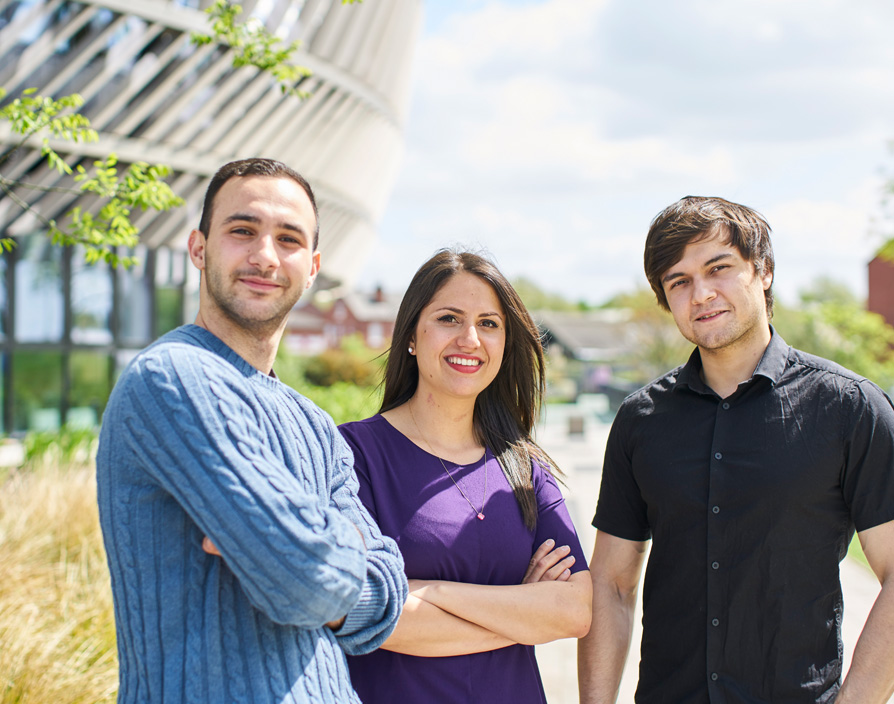From Mark Zuckerberg to Bill Gates, many successful entrepreneurs started out in their university dorm rooms. But when three international students came to the UK, starting a company wasn’t on their agenda. This all changed when they couldn’t order halal food to fuel their late night study sessions.
The friends Rawan Abu-Ishira, Tawfiq Abu-Khajil and Amur Anzorov are originally from Palestine, Jordan and Russia respectively. Their inability to find halal friendly food easily led them to launch Halalivery, an on-demand halal food delivery startup. Think a mix between Deliveroo and scaleups like Guosto that provides customers with recipes and ingredients but specialising in halal meat and you get the idea. “While there are a plethora of food delivery apps, there was nothing for those who wanted halal friendly food,” says Abu-Ishira, the company’s CEO.
The former Nottingham University students drew heavily on their own experience when they ironed out the details of the startup. “As students, we had neither the time nor the resources to travel long distances on a daily basis to eat or pick up foods that meet the halal requirement,” says Abu-Khajil, COO at Halalivery. “Being able to select from a variety of choices of the ingredients, without having to spend time on the whole grocery shopping process and having your favourite halal food conveniently delivered to you was what we needed – so we created it.”
And then the trio, capitalising on their contacts in Nottingham, launched the startup in February 2018, mainly targeting the city’s students. “Out of 70,000 students in total, there are at least 30,000 who are Muslim where 20,000 are international and inevitably getting halal meat is a concern,” Abu-Ishira adds.
The founders confirmed that there was a demand for their services by doing surveys around the university. “The replies we got showed that this is a viable solution and we quickly knew Halalivery is a vision that [can become] a reality,” says Anzorov, CTO at Halalivery.
Despite the ubiquitous demand, getting any app off the ground entails money. While the three co-founders initially bootstrapped the launch, they bulked up their financial muscles in June 2018 by winning Ideas Mean Business, an Innovate UK and The Prince’s Trust campaign designed to support young entrepreneurs. “It was a great benefit for us, not only financially but also in terms of publicity and mentor support,” Anzorov explains. “The advice and feedback we have got from our mentor allowed us to improve our service and increase our growth.”
But reaching this level of success in the infancy stages of their startup requires lots of legwork. To start with, it entailed identifying a list of restaurants to partner with who had halal meat. “We drafted a list of all potential halal vendors in Nottingham and literally just walked through their front doors, spoke to the owner and recruited those who were interested,” Abu-Khajil remembers. The next important task was to ensure the restaurants, grocery stores and butcheries were indeed halal friendly. This is something they’re still consistently doing whenever they add new vendors to their services. “We check their official halal certificates and ensure the source of their meat is from a halal certified supplier,” he adds. “Most of our restaurants get their meat supply from the Halal Monitoring Committee approved meat suppliers.”
Another challenge was getting the vendors to embrace technology which wasn’t an easy task. “They tend to be small businesses that are family owned for over a decade,” Abu-Khajil continues. “[This] sometimes stands as an obstacle. Onboarding new technologies to adopt to enhance their presence and expand beyond their local reach is essential.”
But even with those mountains to scale, the founders are bullish about expanding the startup throughout the UK and even internationally. Today the app has partnered with more than 25 restaurants in Nottingham, three grocery stores and three butcheries.
Their success is unsurprising given how foodtech is not only an upcoming and profitable area but also estimated to be a $5bn industry by 2023. So it doesn’t take an expert to see how food startups like Halalivery are a good bet for investors and entrepreneurs alike.
Still, considering how the co-founders’ passion to disrupt the food delivery industry is almost palpable, it’s easy to see why Halalivery has scaled faster than most new ventures. “You need to believe in the idea to keep going especially in the hardest times,” Abu-Ishira concludes. “Believe in your dreams, never be afraid to fail and work endlessly until your idea has turned into reality.”
We couldn’t agree more. ![]()
Share via:








































